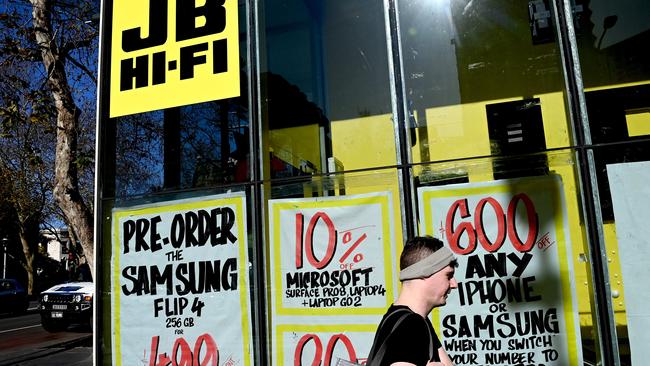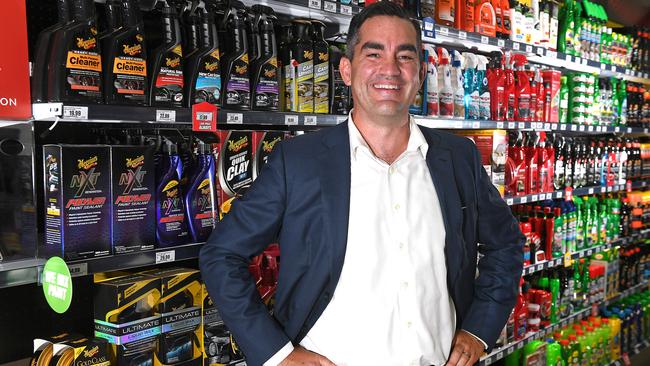Investors shopping for retail shares are urged to tread carefully
Pain is being felt by investors in Temple & Webster, JB Hi-Fi and other retailers, and it’s unlikely to improve quickly. Here’s why.
Retailers’ revenues have risen strongly but their shares are sinking as investors look beyond the numbers into a future clouded by interest rate rises and economic uncertainty.
Shares in JB Hi-Fi and Harvey Norman have slumped more than 7.5 per cent since January, while online retailer Temple & Webster plunged 35 per cent in February alone.
However, some stocks remain resilient, including Kathmandu owner KMD Brands and Super Retail Group, whose portfolio includes Rebel, BCF and Supercheap Auto. Supermarket giants Woolworths and Coles are also holding their ground.
Brokers have 12-month price targets on some retailers well below today’s levels. Ord Minnett has a $35.50 price target on JB H-Fi, while its shares trade near $46, and Macquarie has a $42.20 target.
Citi forecasts a negative 12-month share price return near 13 per cent for Wesfarmers, owner of Bunnings, Kmart and Target.
Analysts say the outlook appears tough, and investors may want to wait a while before shopping for bargains.

Baker Young managed portfolio analyst Toby Grimm said share prices were falling as discretionary spending was hit by household budget squeezes amid high inflation and interest rate rises.
“The honeymoon has lasted longer than most analysts and a lot of investors expected,” he said.
JB Hi-Fi this week reported sales growth had slowed, and had stalled completely at its Good Guys stores.
“Perhaps we are starting to see the tip of the iceberg – there is this expectation of reduced consumer spending,” Mr Grimm said.
“If you look deeper, you realise how good the retailers have had it for two years.” Not only had sales grown strongly, profit margins also had doubled at some retailers as cashed-up consumers had no alternative spending options during the pandemic, he said.
“The question is not only will sales hold up, but how will profit margins go?
“You could get a double-edged sword of falling sales and falling profit margins, and that will magnify the impact on earnings.”
Mr Grimm said going forward, investors would want to be picky about buying retailer shares.
“There will be an opportunity to buy them, but I think that is some way off,” he said.
“I would prefer the staple side of things – they are more defensive and more of a necessity.
“Woolworths and Coles profit margins have declined by 30 per cent compared to averages prior to the pandemic – I think there’s a chance for margin expansion.”
Bell Direct market analyst Grady Wulff said some retailers’ failure to provide clear guidance had caused investors to flee.
“Consumer spending is also set to decline over the coming months away from discretionary goods as the cost-of-living pressures hit harder with every interest rate hike,” she said.
Furniture and homewares retailer Temple & Webster reported record sales, but its profit fell and stock levels rose. “The company increased its inventory to $25.7 million, which is an unhealthy level in this current environment where we are seeing consumers shift from discretionary spending to value spending,” Ms Wulff said.
“The outlook for the retail sector this year is in favour of the value retailers like Best & Less.”

IG analyst Tony Sycamore said consumer spending was suffering from cost of living pressures including the Reserve Bank’s 3.25 percentage points of interest rate rises since May 2022.
“When households and consumers are under budgetary pressure, the first sector impacted is the consumer discretionary sector,” he said.
“On top of that we had the Westpac Consumer Sentiment index, which fell 6.9 per cent – it’s more pessimistic than the GFC in 2008-09 but not quite as pessimistic as Covid.”
Households were worried about inflation and the RBA flagging more rate rises, Mr Sycamore said.
“At the end of the day the RBA is an inflation-fighting bank, and its credibility is under the biggest question mark in 20 years,” he said.
“The only way the RBA will re-establish credibility is to crush inflation, and they’re not going to know whether it’s been crushed until April’s inflation data.”
This could mean more rate rises in March and April and “that’s terrible for those consumer discretionary stocks”.
RETAILER SHARES SINCE LATE JANUARY
Temple & Webster down 35%
Cettire down 22%
Best & Less Group down 19%
Nick Scali down 14%
Myer down 9.2%
Harvey Norman down 7.8%
JB Hi-Fi down 7.5%
Premier Investments down 2.1%
Super Retail Group up 1%
Woolworths up 1.5%
Wesfarmers up 2.5%
Coles up 3%
KMD brands up 5.2%






To join the conversation, please log in. Don't have an account? Register
Join the conversation, you are commenting as Logout